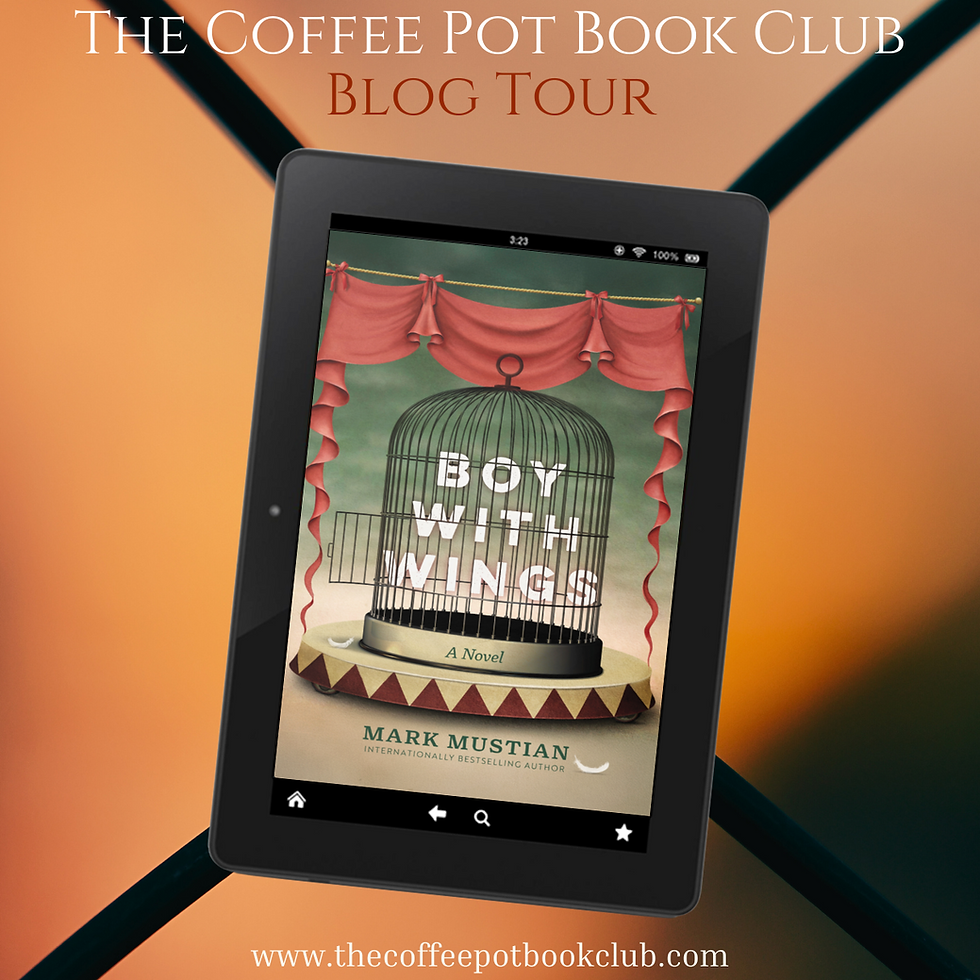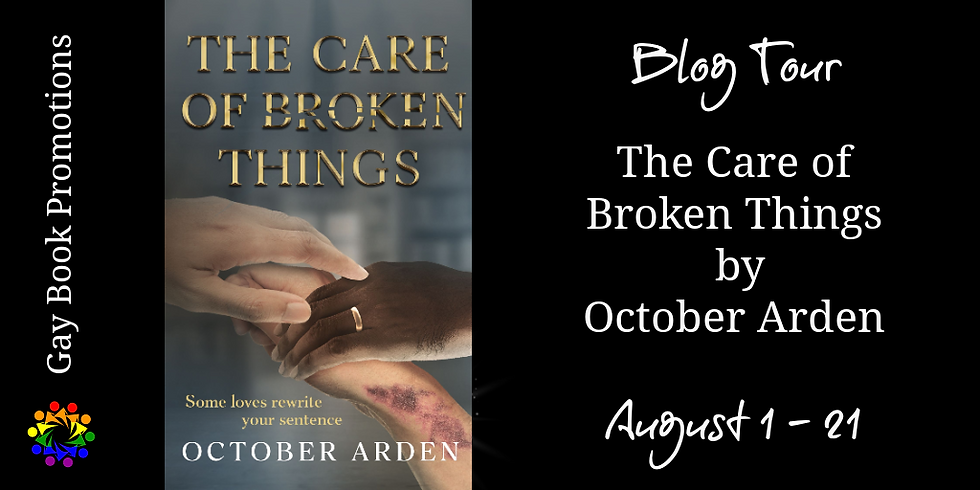Excerpt: Boy with Wings by Mark Mustian
- Archaeolibrarian

- May 26
- 7 min read

Book details:
Book Title: Boy With Wings
Series: n/a
Author: Mark Mustian
Publication Date: March 15th, 2025
Publisher: Koehler Books
Pages: 322


@markmustianauthor @cathie.dunn1 @thecoffeepotbookclub

@thecoffeepotbookclub



What does it mean to be different?
When Johnny Cruel is born with strange appendages on his back in the 1930s South, the locals think he's a devil. Determined to protect him, his mother fakes his death, and they flee. Thus begins Johnny's yearslong struggle to find a place he belongs.
From a turpentine camp of former slaves to a freak show run by a dwarf who calls herself Tiny Tot and on to the Florida capitol building, Johnny finds himself working alongside other outcasts, struggling to answer the question of his existence. Is he a horror, a wonder, or an angel? Should he hide himself to live his life?
Following Johnny's journey through love, betrayal, heartbreak, and several murders, Boy With Wings is a story of the sacrifices and freedom inherent in making one's own special way-and of love and the miracles that give our lives meaning.

Add to Goodreads | StoryGraph | Smashbomb | BookBub


(from Ch. 1, when Johnny is buried alive to fake his death)
Dark, and some close things. The smell of cut boards and dirt.
His hands meet walls, his arms and head and knees, his feet. It’s a box more than walls, pinning and cramping him so that he can’t turn or stretch. He bucks and squirms—though she hates his squirming—his back twitching and sweat running, and when he yells his voice springs like a twig slapping at his face and neck. A blankety thing wraps his legs.
He pushes out and up, down, kicks his feet. She had warned him, he remembers: to be still and quiet, to sleep and to hide. Wasn’t he a smart boy, a good son, the best hider? He lies flat—is he hiding? He lifts again and bumps his head. It’d take time, she said, again and again, before. Her voice was curvy. “You must wait, wait for me to come back and the men to help then.” He hates to wait, though, and his cries settle down on him, bouncing off the wood like beneath her old bed, the hardness below him, the darkness so deep. He wants his things now. He wants her back! He wants to hear laughing or barking or anything else. But he’s stuck in this cramped and strange quiet. Alone.
At night at home, he can see things around him, shapes made of the floor and of the covered bed, but here he can’t seem to. Did he lose his eyes? Goose bumps—that’s what she calls them—swell up, something hard in his throat, too, and though he tries to hold it, he pees. The awful warmth comes and the smell soon behind it, and he hears things now or thinks them, whispered things like songs or words. She held him and rocked him before the cloth wrapped his face, and when he slept, he dreamt bird dreams, of darting and pecking and flapping and swooping, feathers up, feet down, claws out. Sparks flash when his eyes shut. “Be brave,” she whispered. “Be calm when you wake. I will come and get you, release you. Stay quiet and still.”
Still. “Why?” This was shushed, finger to lips. Grownups do this. He is six. He makes lists of the things he knows: that he lives in Florida, before that in Alabama. That the car they rode in once was a Model Z. Or was it P? (He mixes his letters up). That butterflies are first bugs. That the sun comes up and stars come out and men can touch wires on a box and make it sing. He knows that eggs are laid and will break, that in the sky there is heaven. He knows of mothers and fathers. He doesn’t know why he can’t move or see.
He cries or he thinks he does, his face and neck wet with it, and her crying comes, too, from before: the sound past the doorway, the talk coming through that he knew was of him. A new voice—Mr. Paul, who owns the house, or maybe Mr. Tom—his words of noses or hoses, of being able to breathe, of how this trick would be made to work. (Necessity—what is necessity? Maybe a secret or a made-up word.) They talked about him this way, whispers that jumped like winged beetles or rabbits, and there was the time that the man had stared down at his back.
“Devil.” The word whistled.
“It’s just a mark. Lots of people have them. It’s nothing.” Her voice with bright lines. He’s looked at his back in the mirror or tried to, the purple splotch forming a hill or a springy knife. It doesn’t hurt and he can’t touch or reach it, and he thought that everyone had one until he found out they don’t. He asked his mother about it.
“Don’t worry.” Her face frowny-small.
Mr. Tom spoke some more, his yellow hair shining, not white like the boy’s but close. “You’ll have to do something, Lena. You’ll have to go. Them people down at the church, they ain’tgonna . . . The word’s out. It’s . . . well, it’s just they believe this is . . .! I even heard it at the jook joint when I took things out that way. You know--”
“I’m sick just now, Tom.” Her low voice, the one that’s like clouds or mud. “I can’t run just yet. It ain’t nothing with Johnny, nothing bad! People gotta accept it. And you—telling me this. You’re believin’ it, too, are ya?”
“I’m just sayin’ what I heard. Pastor Mills called it, said that mark could cast a pall, that the whole . . . Kids have died . . . Why, they’ll burn . . .”
Voices rise, high ones like children, and he listens but they go away. They could be near or far, and maybe he knows them, though he knows almost no one. They’ve moved a lot, and at his few times at schools the others laughed or turned away from him. Or called him names: “Ogre!” “Freak!” He had to ask her what these meant. Some wanted to touch his hair, even one of the teachers, Mrs. Wickham, rubbing her hand through it: brushing and lifting his shirt. “I’ve never seen anything like . . . Your eyes are like emeralds. Are you an albino?” A rhino? He shook his head.
Others asked of his powers—other children, some adults. “We heard you have powers,” they would say, their faces scrunched. He fell from a cupboard the one time he tried to fly. He’s not strong like the soldiers in the picture books she brings home. He can’t spit far or whistle or jump high or even swim. So he asked her. She answered calmly, in her softest voice: “You are yourself, only. Don’t worry on what others think. You’ll do more when you’re older.” But if he were older, he’d break the box, lift the boards off like his toys, and toss them up and far away, and he’d have powers then, like a bird that gets bigger and flies. Maybe. Sometime, when he’s older. Or after a while, or maybe not. He doesn’t know.
He cries again, loudly. She won’t like him crying. He has friends, pretend friends, Robert and Buster, and for a time they talk. He asks what they are doing (Buster: listening to the radio; Robert: playing with his toys) and he tells them of the darkness, his hiding and the box, at least until he grows tired. They don’t care that he peed.
He won’t be . . .
He won’t let . . .
He won’t stay . . .
He tries to hear more but he can’t, his breath loud and he screams some, gasping for air until his throat feels raw and red, banging his arms and feet till they’re numb. It’s as if he’s under the water in the tin soaking tub, everything pressed around him and squeezing, making things blurry, the sound soft then gone, and how could she leave him, alone here in this cage?
He was cold before but is hot and things stink, and maybe he sleeps or dreams. He knows that things die and maybe now he’ll die, too, and he bangs on the box again, pushing each side of it. A spray of dirt washes in that he flicks his tongue at and breathes. His coughs rise the way hers do, a crumpled tail to them, and when he closes his eyes this time the dots fade, smoothed to thin ribbons, black and forgotten like something from long before. From far off a clink comes, voices again in the dirt and the dark, and he trusts and believes none of it, calmed now by the darkness, the closeness, until something heavy strikes the box. There’s a tilting and scraping, the low sound of grunts and the hiss of breath blown. He stays still as she told him, waiting and not waiting, and when the top is ripped open in a flash of light, he is quiet still, cooled, saved. Seen.
Revealed.



Mark Mustian is the author of the novels "The Return" and "The Gendarme," the latter a finalist for the Dayton International Literary Peace Prize and shortlisted for the Saroyan International Award for Writing. It won the Florida Gold Book Award for Fiction and has been published in ten languages.
The founder of the Word of South Festival of Literature and Music in Tallahassee, Florida, his new novel, "Boy With Wings," is out in 2025.
Author Links:
Website:https://markmustian.com/
Twitter:https://twitter.com/@markmustian
LinkedIn:https://linkedin.com/in/mark-mustian
Bluesky: https://markmustian.bsky.social
Amazon Author Page:https://www.amazon.com/stores/Mark-T.-Mustian/author/B0CSF8JY2Y
Tour hosted by: The Coffee Pot Book Club











Thank you so much for hosting Mark Mustian today, with an intriguing excerpt from his new novel, Boy With Wings. Take care, Cathie xx The Coffee Pot Book Club